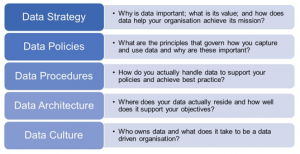Introducing a new framework for Data Governance
Harnessing data can work wonders for your organisation!
Data sits at the heart of our organisations. At least it should! However, while we often consciously invest in and develop our processes, information systems and IT infrastructure, far fewer organisations actually invest in their data or know how to do this. Very few have a data strategy or understand their data well enough to know if it is fit for purpose and whether it is helping the organisation to grow or achieve the mission.
A Data Governance Framework is an approach to making sure you are effectively and consistently managing your data right across the organisation. It provides a structured approach to harnessing your data and it helps identify how to improve it. The framework covers 5 dimensions as follows. Each dimension is mutually dependent on the other and together they each play an important part in your data governance.
Where to start if you want to implement a Data Governance Framework
Most data governance projects start a bit like this…
Establishing the Case for Change: The starting point for any change is to be able to articulate the high-level issue or opportunity. This can be achieved through meetings, workshops, interviews etc or it may already be well understood. From this you can begin to scope out the strategic context and the importance of data to your organisation and the case for change.
Form a Steering Committee: You will want to establish the team who will take responsibility for progressing this initiative and agree some simple terms of reference.
Get Support: You need to decide who else needs to support you as you will want to get their attention, feedback and buy-in.
Scope the project: Using the Data Governance Framework you can begin to assess the current situation and identify the ‘gaps’ or desired changes you’ll want to make. The following questions are examples of what you may ask:
- Data Strategy: Do you understand the role or potential of your data and how it helps your organisation deliver its services and grow?
- Data Policies: Do your policies pave the way for using data more effectively, while ensuring compliance, and are they aligned to your strategy?
- Data Procedures: Are your procedures accurate and do they represent best practice?
- Data Architecture: Do you know what data you own, where it lives, and where it really should be managed to effectively support your business processes?
- Data Culture: Do you really understand what is happening on the ground, and the barriers to being more data driven?
Define the project and business case: You will have enough information by now to define the objectives and scope of your project and case for investment.
Benefits of Better Data Governance
There are numerous benefits of implementing a framework for Data Governance:
- Increased process efficiencies
- Clearer visibility on data ownership and accountability
- Less dependency on key staff
- Better ability to respond to digital innovations
- More consistent reporting across the organisation
- Improved assurances of GDPR compliance
- Maximise and grow the value of your data assets
How to find out more
The Data Governance Framework approach will be covered by Rob Gethen Smith as part of the Data Protection session at the Charity Accountants’ Conference which this year takes place in Solihull on 20-21 September.
You can also contact Rob direct via email [email protected] to find out more about the Framework and how to implement one within your organisation.
About Rob Gethen Smith
Rob Gethen Smith is a digital technology and business change expert. He is a Partner at Adapta Consulting where he uses his 20 years industry experience to advise organisations on the effective use of information systems. He is also a Trustee for the international animal welfare charity SPANA. Rob has worked as Chief Information Officer at Anthony Nolan, Southbank Centre, Tate and Macmillan Cancer Support to develop joined up business and technology strategies and lead change initiatives.
